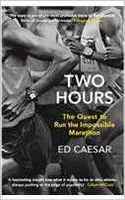
Two Hours - by Ed Caesar
Reviewed by Kate Maslin of Hedge End Running Club
I have accumulated lots of books about marathon training and running over the past few years so when I saw the chance to review “two hours” I was keen. I had heard the author, Ed Caesar, being interviewed on “Marathon talk” podcast so I was already aware of the premise of the book. In brief, it aims to unravel and discuss the concept of the sub two hour marathon: if it is theoretically possible, the scientific background, the psychology involved and the progress towards breaking the target so far.
Like the sub four minute mile sixty years ago, the sub two hour marathon is an arbitrary target which has been debated for some time by commentators and scientific experts alike. Since 2003, the world record for the marathon has been reduced by two minutes to 2.02 and is now held by Dennis Kimetto. Considering the first Olympic marathon was run in a time of just under 3 hours, the sub twohour marathon is becoming more tangible. However some experts contend that it is outside the realm of human endurance, without the use of performance enhancing drugs.
Much of the book profiles the story of Geoffrey Mutai, a Kenyan elite marathon runner who has won several marathon majors including New York and Boston, the latter which he won in a time of 2.03 in 2011. Similar to the book “Running with the Kenyans”, this book explains the theories behind why East African runners are so prolific: from their upbringing at altitude, their build, running style, diet and desire to succeed. Interspersed with the stories from Mutai’s perspective, there are sections of the book detailing the history of the marathon, and opinions from scientific experts from a range of disciplines whether the sub two hour marathon is likely to happen, in this lifetime or ever. There is also a short section of the book discussing the controversial role of blood doping, however as the most recent allegations about Russian and Chinese athletes occurred after the book was published, the landscape of blood doping and perception of endurance athletes has further changed since. Each of the chapters are relatively concise, allowing the reader to dip in and out of the book on different occasions.
At around 200 pages, it is quite a short book and retains the interest of the reader well. Being a marathon enthusiast, it was of great interest to me, however I’m not convinced whether it has mass appeal to a general sports fan. It was an engaging read, however I felt the book focused more on the story of Geoffrey Mutai, rather than the sub two hour marathon itself. Overall it probably leaves the reader with more questions than answers, so it is a thought-provoking read rather than offering a definitive conclusion, which is not necessarily a bad thing.
About Kate
I ran my first marathon in 2008 and have since ran 10 marathons in total, with a PB of 3 hours 19. I completed a degree in exercise science, before training to be a dietitian, so I have a professional interest in the science of health and exercise, as well as a general interest in running from a hobby point of view. Mostly I enjoy how accessible running is, the camaraderie it involves and the challenge that comes with training to try to make improvements


